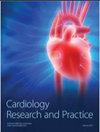Dexmedetomidine Reduces Incidences of Ventricular Arrhythmias in Adult Patients: A Meta-Analysis
IF 1.8
4区 医学
Q3 CARDIAC & CARDIOVASCULAR SYSTEMS
引用次数: 3
Abstract
Purpose To assess the antiarrhythmic properties of dexmedetomidine in patients in the intensive care unit. Methods A literature review was conducted with Ovid MEDLINE (R), Cochrane Central Register of Controlled Trials, Cochrane Database of Systematic Reviews, Embase, and Scopus. Study Selection. Randomized controlled trials were included, examining the incidence of ventricular arrhythmias, ventricular tachycardia, or ventricular fibrillation with dexmedetomidine compared to placebo or an alternative sedative agent. For each publication that met the selection criteria, the patient demographics, incidence of arrhythmias, mortality, and adverse events were collected. Data extraction was carried out by two authors independently. Results We identified 6 out of 126 studies that met the selection criteria for our meta-analysis, all of which focused on the perioperative cardiac surgery period. Patients receiving dexmedetomidine demonstrated a significant reduction of the overall incidence of ventricular arrhythmias (RR 0.35, 95% CI 0.16, 0.76). In particular, dexmedetomidine significantly decreased the risk of ventricular tachycardia compared with control (RR 0.25, 95% CI 0.08, 0.80, I2 0%). Regarding adverse events, dexmedetomidine significantly increased the frequency of bradycardia (RR 2.78 95% CI 2.00, 3.87). However, there was no significant difference in mortality (RR 0.59 95% CI 0.12, 3.02). Conclusion From this meta-analysis, we report a decreased incidence of ventricular tachycardia with dexmedetomidine in critically ill patients. This result favors the use of dexmedetomidine for its antiarrhythmic properties.右美托咪定降低成人患者室性心律失常的发生率:一项荟萃分析
目的评价右美托咪定在重症监护病房患者中的抗心律失常特性。方法采用Ovid MEDLINE (R)、Cochrane中央对照试验注册库、Cochrane系统评价数据库、Embase和Scopus进行文献综述。研究选择。纳入随机对照试验,检查右美托咪定与安慰剂或替代镇静剂相比室性心律失常、室性心动过速或室性颤动的发生率。对于每个符合选择标准的出版物,收集患者人口统计数据、心律失常发生率、死亡率和不良事件。数据提取由两位作者独立完成。结果:我们从126项研究中筛选出6项符合meta分析的选择标准,所有这些研究都集中在心脏手术围手术期。接受右美托咪定治疗的患者室性心律失常的总发生率显著降低(RR 0.35, 95% CI 0.16, 0.76)。特别是,与对照组相比,右美托咪定显著降低室性心动过速的风险(RR 0.25, 95% CI 0.08, 0.80, i20 %)。关于不良事件,右美托咪定显著增加心动缓的频率(RR 2.78 95% CI 2.00, 3.87)。然而,死亡率无显著差异(RR 0.59 95% CI 0.12, 3.02)。结论:从这项荟萃分析中,我们报告了右美托咪定在危重患者中降低室性心动过速的发生率。这一结果有利于使用右美托咪定抗心律失常的特性。
本文章由计算机程序翻译,如有差异,请以英文原文为准。
求助全文
约1分钟内获得全文
求助全文
来源期刊

Cardiology Research and Practice
Medicine-Cardiology and Cardiovascular Medicine
CiteScore
4.40
自引率
0.00%
发文量
64
审稿时长
13 weeks
期刊介绍:
Cardiology Research and Practice is a peer-reviewed, Open Access journal that publishes original research articles, review articles, and clinical studies that focus on the diagnosis and treatment of cardiovascular disease. The journal welcomes submissions related to systemic hypertension, arrhythmia, congestive heart failure, valvular heart disease, vascular disease, congenital heart disease, and cardiomyopathy.
 求助内容:
求助内容: 应助结果提醒方式:
应助结果提醒方式:


